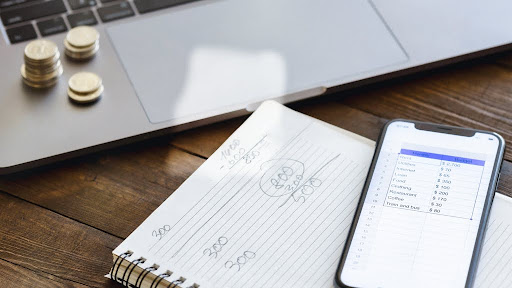Free Expense Tracker Apps to Help You Manage Your Expenses

Last updated: 01 July 2025
Written by: Circles.Life
12 minutes read
Keeping track of your expenses has never been more important. In Singapore, where the cost of living continues to climb, budgeting is no longer just good practice. It's a key part of staying financially secure. From dining out and transportation to mobile plans and subscriptions, daily spending can add up quickly without you noticing.
Managing your money digitally makes this process more efficient. With the rise of user-friendly apps, tracking your personal finances no longer requires spreadsheets or manual logs. These tools help you understand your spending patterns, set savings goals, and make better financial decisions.
In recent years, digital expense tracker apps have become increasingly popular. Many of them are free and offer features like category tagging, visual reports, and syncing with bank accounts.
In this guide, we cover seven free budgeting tools available in Singapore:
Monny – A fun, gamified app designed for new budgeters
Money Manager – Simple to use, with strong categorization features
Dollarbird – A calendar-style tracker for daily expenses
Household Account Book – Visual stickers and family-friendly design
MoneyNote – A clean, minimalist app with quick tagging
Best Free Expense Tracker Apps in Singapore
1. Monny – Gamified interface, fun UI, good for beginners
Monny is a playful and beginner-friendly budgeting app that turns expense tracking into a game. The app uses a fun, quest-style interface where users complete tasks, earn badges, and unlock achievements while logging their daily spending. It’s designed to make money management feel less like a chore and more like a daily habit.
Key Features:
Gamified system that rewards users for consistent tracking
Simple, colorful visuals and interactive feedback
Built-in budget planner and spending breakdown
Set saving goals and review monthly reports
Password-protected mode for privacy
Who It’s For:Monny is best for beginners, students, or anyone who wants a light-hearted way to build a budgeting habit. It's especially helpful for users who have never tracked spending before and want a less serious, more motivational tool.
Pros & Cons:
Pros:
Engaging and motivational design
Easy to use, even for first-timers
Encourages daily tracking through challenges
Cons:
Not ideal for complex budgeting needs
Limited features in the free version
Availability:Available for iOS and Android, free with optional in-app purchases
2. Money Manager – Simple UX, strong categorization
Money Manager is a straightforward, no-frills budgeting app focused on usability and clarity. Its clean design and logical layout make it easy for users to input expenses, organize them into categories, and monitor their financial health. The app also supports both daily tracking and long-term budget planning, which makes it versatile for a variety of financial habits.
Key Features:
Simple interface with intuitive navigation
Detailed categorization of expenses and income
Calendar view for tracking daily and monthly spending
Built-in asset management tool
Visual charts and summary reports for budgeting insights
Who It’s For:
Ideal for freelancers, professionals, and families who want a reliable tool to manage personal or household budgets without extra distractions. It’s a solid option for users who prefer function over flair.
Pros & Cons:
Pros:
Easy to set up and start using
Strong tracking and classification tools
Visual reporting supports better financial decision-making
Cons:
No gamification or community features
Some functions (like syncing) are only available with a paid upgrade
Availability:Available on iOS and Android, free with optional in-app purchases
3. Dollarbird – Calendar view of spending
Dollarbird takes a unique approach to budgeting by focusing on a calendar-style interface. Instead of listing expenses in a ledger or table, users log their income and spending directly on calendar dates. This helps visualize cash flow over time and spot spending trends across weeks or months. It’s especially useful for users who want to understand not just how much they’re spending, but when.
Key Features:
Calendar-based interface for daily income and expense tracking
Predictive balance forecasting based on recurring transactions
Multiple color-coded categories for clear insights
Shared calendar option for family or team budgeting
Offline mode and cloud sync available
Who It’s For:Great for freelancers, families, and users with variable incomes. It’s particularly helpful for those who want a better grasp of cash flow timing, such as when bills hit versus when payments are received.
Pros & Cons:
Pros:
Intuitive calendar design makes spending easier to understand over time
Encourages consistent tracking with a visual approach
Supports shared budgets for families or partners
Cons:
Can take some time to set up categories and recurring items
Requires regular logging to stay accurate
Availability: Available on iOS and Android, free with optional in-app purchases
4. Household Account Book – Visual stickers, great for families
Household Account Book is a playful, family-friendly budgeting app that uses visual stickers and illustrations to make expense tracking more engaging. Designed like a digital diary, it helps users log their daily spending with cartoon-style icons and simple inputs. The interface is approachable for users of all ages, making it ideal for parents who want to involve kids or partners in managing household finances.
Key Features:
Visual stickers to represent categories like groceries, rent, or entertainment
Monthly summaries and savings goals
Illustrated mascot provides reminders and encouragement
Simple expense logging with minimal text input
Child-friendly layout to encourage shared budgeting
Who It’s For:Perfect for families, couples, and beginner users who prefer a more visual and less technical approach to tracking expenses. It’s also a helpful introduction to budgeting for children and teens.
Pros & Cons:
Pros:
Fun and friendly interface that feels more like journaling than accounting
Encourages regular use through visual cues
Easy to use, even for young or first-time users
Cons:
Limited in terms of financial analysis and customization
May not meet the needs of users with complex financial tracking goals
Availability:Available on iOS and Android, free with optional in-app purchases
5. MoneyNote – Clean interface, easy tagging
MoneyNote is a minimalist expense tracker that focuses on fast input and clean visuals. With a clutter-free design, it lets users log spending and categorize expenses quickly. Its simple tagging system helps organize entries without overwhelming the user, making it perfect for those who value speed and clarity over advanced features.
Key Features:
Streamlined interface for quick expense entry
Customizable tags for easy organization
Daily, weekly, and monthly summaries
Simple budget planning tools
No sign-up required to start using the app
Who It’s For:Best for beginners, solo professionals, and users who want a low-effort way to log expenses. MoneyNote is ideal for people who prefer simplicity and don’t need complex reporting tools or account syncing.
Pros & Cons:Pros:
Very easy to use, even with no prior budgeting experience
Quick entry saves time for users on the go
Lightweight and runs smoothly on most devices
Cons:
Lacks advanced features like account syncing or cloud backups
Limited export and reporting options
Availability:
Available on iOS and Android, free with optional in-app purchases
Features of a Good Budget Tracker App
Not all budgeting apps are built the same. A good expense tracker should do more than just record your transactions. It should help you understand your financial habits, alert you when spending goes off track, and support your long-term goals. Here are the features to look for in a reliable budget tracker or financial planning software in Singapore.
Real-Time SyncThis feature ensures your data updates instantly across all devices. It's helpful for individuals and families who track spending on the go or share budget responsibilities.
Bank IntegrationA well-rounded online budget system should connect securely with your bank accounts or credit cards. This allows your expenses and income to be pulled in automatically, saving time and improving accuracy.
Visual Reports and Spending InsightsVisual tools like graphs, charts, and summaries make it easier to spot trends. When you can clearly see where your money is going, it becomes easier to adjust your behavior and stay within budget.
Budget AlertsNotifications and reminders keep you on track. Whether it's a warning about reaching your spending limit or a reminder for an upcoming bill, alerts help prevent budget slip-ups before they happen.
💡 Bonus Tip: Save Even More with a Smarter Telco PlanYour mobile plan is a recurring expense, so it should be included in your monthly budget. Tracking your telco spending helps you stay aware of hidden costs and overpayments. If you're not using all your data or talk time, you might be spending more than necessary.
Switching to a budget-friendly mobile plan, like those from Circles.Life, can reduce monthly costs and free up money for savings or other essentials. Most expense tracker apps let you assign categories to telco expenses, so be sure to track mobile bills along with your other financial commitments.
Recommend Circles.Life’s Budget Plans
Circles.Life offers affordable, flexible plans designed to fit different lifestyles and financial goals. These plans are perfect for anyone looking to stay connected while keeping mobile expenses predictable and under control.
Last updated on: 9 June, 2025
Each plan is contract-free, easy to manage via the Circles.Life app, and includes access to CirclesAI, powered by OpenAI's latest models, to help with everyday productivity.
Final Thoughts
Staying on top of your finances doesn’t have to be complicated. The best expense tracker apps help you build better habits by making budgeting clear, simple, and even enjoyable. Whether you prefer visual tools, calendar-based tracking, or just quick logging on the go, there’s an app for every type of user.
Free apps like Monny, MoneyNote, and Household Account Book are great starting points for beginners or families. If you’re looking for more advanced insights or features like bank syncing and AI-powered recommendations, apps like Spendee and Dobin offer a deeper level of support for long-term money management.
There’s no single best app for everyone. Try out a few options to see which one fits your lifestyle, goals, and budgeting habits. With the right tool in your pocket and a budget-friendly mobile plan like Circles.Life, managing your money in Singapore becomes a lot easier and a lot more effective.
FAQs About Expense Tracker Apps
Why use a budgeting app instead of manually maintaining a sheet?Budgeting apps offer real-time tracking, automatic summaries, and mobile access, making it easier to stay consistent. Unlike spreadsheets, apps can send alerts, visualize your spending, and save time by automating repetitive entries.
Can I sync my budgeting app with bank or telco payments?Yes. Apps like Spendee and Dobin allow secure syncing with bank accounts and can track telco charges as recurring expenses. This gives you a more complete view of your monthly financial commitments in one place.
Why should I track my mobile spending separately?Your mobile plan is a recurring cost, just like rent or groceries. Tracking telco charges helps identify if you're paying for unused data or features. Using a budget-friendly plan, like those from Circles.Life, can help lower your monthly expenses and free up savings.
Are free budgeting apps safe to use in Singapore?Most popular apps follow strong security protocols, especially those available on the App Store or Google Play. Look for apps with secure data policies, privacy controls, and local reviews. Avoid apps that request unnecessary access to sensitive data.
Can I use budgeting apps offline?Some apps like MoneyNote and Dollarbird allow offline entry. Your data will sync when you reconnect to the internet. This is especially useful for logging expenses on the go, even when you're traveling or in low-signal areas.
Share
RECOMMENDED
Step-by-step guide to calling a Hong Kong landline or mobile: Dial 001-852-Area Code-Landline or 001-852-8-digit Mobile Number.
Compare the best SIM-Only plans in Singapore. Discover the cheapest, family-friendly, and most data-packed options for all mobile data users.
Discover the top foldable phones of 2025 from Samsung, Apple, Oppo & more. Compare features, display, and performance for buyers in Singapore.

Want more?
Subscribe to our newsletter and get notifications when there’s more to read!
By submitting your details, you consent to us sending you promotional and marketing updates. Please read our Privacy Policy for more information.